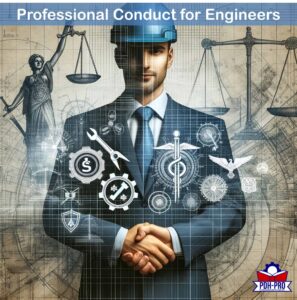What is Professional Conduct?
Every profession has a specific code of conduct that guides professionals as they go about their professional business. The engineering profession is no different. As someone once said, people will forget what you did, who you are, or what you stand for but they will never forget how you made them feel.
Let’s Start with the Definition
The Oxford English Dictionary defines conduct as a person’s behavior in a particular situation or place. Professional conduct, therefore, refers to the behavior a professional is supposed to show in a particular place or situation.
Therefore, these are the guiding principles for professionals that enable smooth interaction with workmates and customers. Frankly speaking, people find it easier to work with people who follow a certain conduct when it comes to relations with people.
Examples of Professional Conduct in the Workplace
How professionals treat the people they interact with at the workplace, especially customers, can be the difference between whether they will ever get the chance to serve those people again or not.
There are various examples of how people can conduct themselves professionally in the workplace.
Showing Trustworthiness
We have to agree that in today’s world trustworthiness is a quality that is in scarce supply. Trustworthiness can be said to be the ultimate mark of a professional. It can mean many things. It might be that one deals with their assigned tasks on time and meet deadlines or being a reliable person who can be trusted even with most minor of tasks. Accountability is also a sign of trustworthiness. This means one is ready to step forward and take responsibility for their actions.
Showing Ethical Behavior
Ethical conduct is behaving within the set moral standards in conformity with the accepted code of conduct. Ethical behavior enables one to live with a clear conscience that isn’t bogged down by the transgressions that are a result of unethical behavior.
Being honorable and of integrity
Warren Buffet once said that he wouldn’t bother with a person if he had all the best qualities a person can have but lacked integrity. Being honorable and of high integrity is a mark of a person with a pleasantly whole personality. The fact that people with integrity are rare today makes this an invaluable attribute in the workplace.
Striving for Excellence
A person who strives for excellence stands out in a crowd. His work stands out and often gains the recognition of colleagues and supervisors. Don’t worry if they don’t acknowledge your efforts. You are doing it for you. As it’s commonly said, if you don’t create excellence with whatever you have at the moment, chances are that you won’t get it wherever place you might go.
Showing Courtesy and Respect
Courtesy in the workplace smooths everyday interactions as well as enabling the growth of better interpersonal relations. This means being amiable and polite in order to avoid unnecessary quarrels at the workplace. We all have to agree that we would respect a person who is also respectful and courteous.
Transparency and Honesty
Another great quality that is in short supply currently, is transparency and honesty. Dishonest people are trust killers and might make or break any company. If we are candid then we should both agree that honesty isn’t a quality that is appreciated only at the workplace. Even in our day to day lives we get drawn more to honest people than lairs.
Working Smart
Nowadays working hard is becoming increasingly old fashioned. Companies need people who can work hard and smart. Smart and hard workers show that they have the interests of the company at heart and always inevitably get promoted after some time.
Effective Communication
Communicating with workmates effectively has the can help in preventing any potential disagreements at the workplace. It is a precursor to better relations with your workmates or customers.
Appropriate Office Fashion
This would depend on the type of dressing that your company accepts or allows. Whether allowed to dress casually or in official attire, it is imperative that one’s dressing is as decent as possible. This helps avoid distracting fellow workers or making them uncomfortable around you. Always dress nice.
Punctuality
No one loves a person who can’t keep time. Timeliness is a mark of an organized and considerate person who takes other people’s time into consideration. Late coming is against the professional conduct of many workplaces and is a sign of indiscipline.
Why Should Engineers Conduct Themselves Professionally?
Engineers should conduct themselves professionally for a number of reasons.
Firstly, engineers must conduct themselves professionally so as to enhance the honor of the profession. In this regard, an act of bad faith by one engineer soils the profession’s good name.
Secondly, they should conduct themselves in a professional manner so as to maintain the reputation of the profession. This is a reputable profession that aims to serve with the utmost diligence and has a direct impact on the quality of life of many people.
Lastly, they should behave professionally so as to enhance the usefulness of the profession. This should be one of the most trusted professions due to their crucial role in nation-building. The value of the profession cannot be compromised.
Engineers are therefore expected to uphold a certain standard of professional conduct that is in strict conformity with their code of ethics.
Benefits to Individual
There are several benefits that an engineer would gain from conducting themselves professionally.
Engineers who conduct themselves professionally enjoy better relationships with their counterparts and clients. No one would want to associate themselves with an unprofessional engineer who doesn’t adhere to basic social laws.
The good thing about being professional as an engineer is that it might be easier for you to gain more clients as well as keep the current ones. For instance, no one can stand a corrupt engineer. Such engineers are bound to lose clients and have trouble attracting new ones.
There is peace of mind from behaving professionally. A professional engineer would have to adhere to the code of ethics and as a result, wouldn’t involve themselves in shoddy dealings. Such a person wouldn’t have to deal with his conscience and hence have peace of mind.
Benefits to Society
The society would also greatly benefit from engineers going about their business professionally.
For starters, members of the society would feel like they can trust any engineer. They wouldn’t have to be in constant fear of being scammed by shady engineers. This is because the profession would be in a position of trust with society.
Also, the society would be confident that they can receive quality service from professional engineers. Unprofessional engineers have a tendency to give poor services.
Are There Rules of Professional Conduct for Engineers?
Rules of professional conduct for engineers do exist. Each country has an engineering board or association tasked with giving the rules that members of the profession are to uphold.
For example, in the United States, the National Society of Professional Engineers (NSPE) is responsible for coming with these rules that all members of the profession in the country are supposed to conform to.
Responsibilities of a Professional Engineer
According to the Conference of Engineering Societies of Western Europe and the United States of America professional engineer has a duty to the society to take personal responsibility for the development and engineering science and expertise in manufacture, research, design, construction and in the engineer’s education.
Code of Conduct for Professional Engineers
Engineers just like in other professions have a code of conduct that informs their professional behavior. It is the guiding principle for the way engineers are supposed to carry themselves in their day to day operations.
The code of conduct ensures the engineers are accountable to the society for their deeds; good or bad. Any engineer who goes against this code risks losing their license to practice. It is better to be safe than sorry by adhering to what the code of conduct dictates.
What Is the Role of Ethics in Engineering?
Ethics are the moral fiber of any society. As previously stated, engineering has a hand in almost all aspects of the quality of life. It is therefore paramount that engineers carry out their societal roles in an ethical manner. Ethics also ensures engineers practice only in their area of specialization. An engineer who studied a certain type of engineering shouldn’t have any business practicing a different type.
They also ensure that engineers in their professional duties hold paramount public welfare and safety as well as conform to the principles of sustainable development.
Engineering Code of Ethics
The code of ethics in engineering governs the way professional engineers are supposed to conduct themselves as they carry out their roles in the society. It prevents unethical practices such as corruption from permeating the profession and putting the safety and welfare of the society at risk.
Should Engineers Follow Professional Ethics?
Engineers should follow professional ethics since they owe it to the profession to uphold its reputation and ensure the safety and wellbeing of the public.
